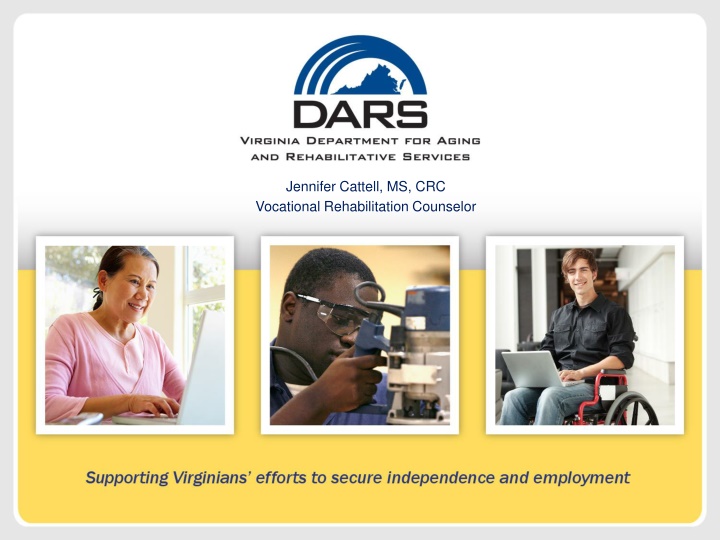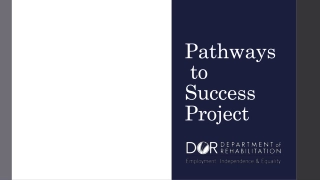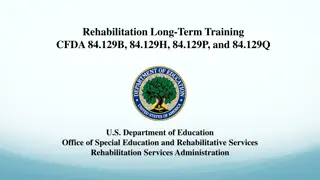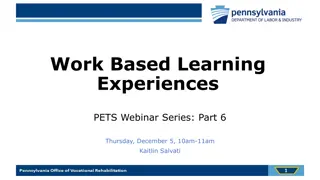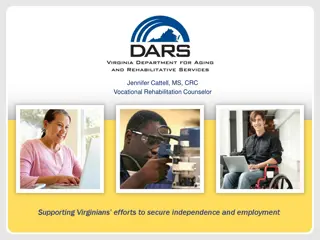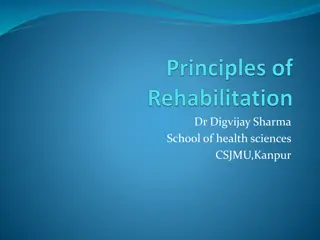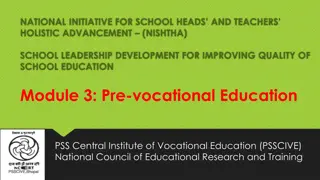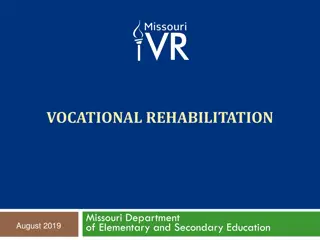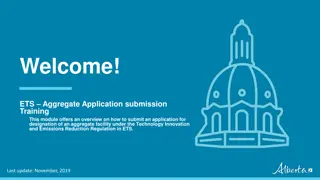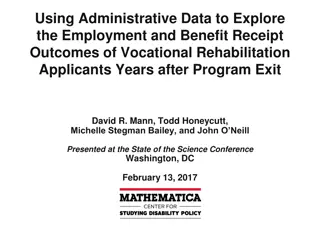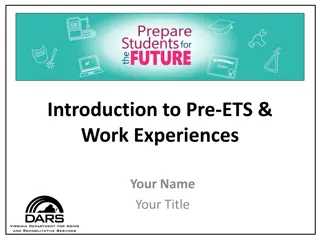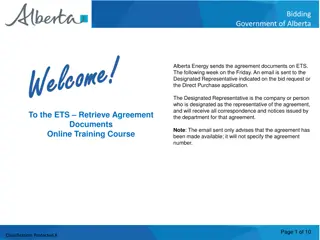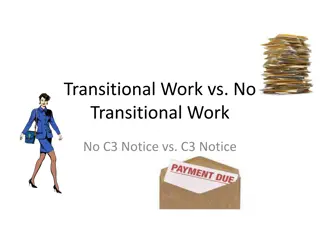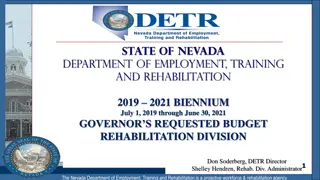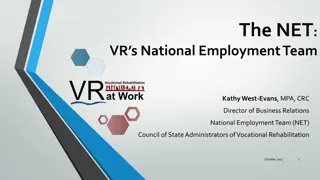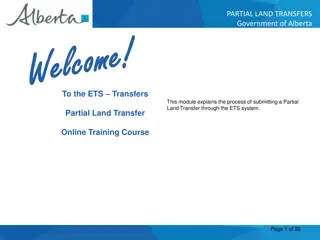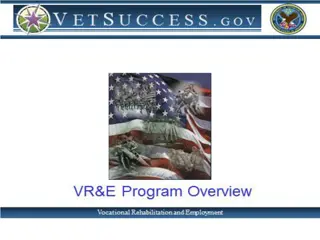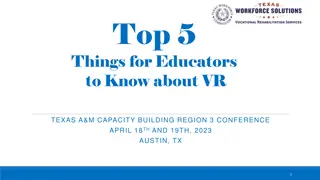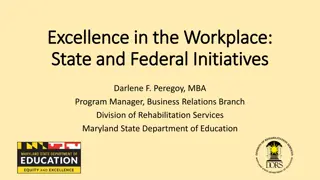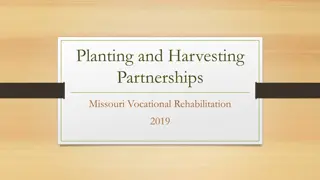Vocational Rehabilitation Services and Pre-ETS Overview
Learn about the Department for Aging and Rehabilitative Services (DARS), Division of Rehabilitative Services, role of a rehabilitation counselor, Pre-Employment Transition Services (Pre-ETS), eligibility criteria, and Vocational Rehabilitation program. Discover how these services assist Virginians with disabilities in preparing for and maintaining employment opportunities.
Download Presentation

Please find below an Image/Link to download the presentation.
The content on the website is provided AS IS for your information and personal use only. It may not be sold, licensed, or shared on other websites without obtaining consent from the author.If you encounter any issues during the download, it is possible that the publisher has removed the file from their server.
You are allowed to download the files provided on this website for personal or commercial use, subject to the condition that they are used lawfully. All files are the property of their respective owners.
The content on the website is provided AS IS for your information and personal use only. It may not be sold, licensed, or shared on other websites without obtaining consent from the author.
E N D
Presentation Transcript
Jennifer Cattell, MS, CRC Vocational Rehabilitation Counselor
What is DARS? The Department for Aging and Rehabilitative Services, DARS' mission: to improve the employment, quality of life, security, and independence of older Virginians, Virginians with disabilities, and their families. DARS is a federal-state program offering vocational rehabilitation services for individuals with disabilities to prepare for, enter, and maintain employment Division of Rehabilitative Services* Vocational Rehabilitation Pre-ETS and Transition Services Wilson Workforce and Rehabilitation Center Rehabilitation Technology Services Virginia Assistive Technology System (VATS)
Division of Rehabilitative Services The Division of Rehabilitative Services (DRS) offers Pre-Employment Transition Services and Vocational Rehabilitation to assist people with disabilities to prepare for, secure, retain or regain employment. Our goal is integrated community based competitive EMPLOYMENT. Vocational Rehabilitation (VR) Pre-Employment Transition Services (Pre-ETS)
Role of a Rehabilitation Counselor A Rehabilitation Counselor is a trained counselor who works with individuals, their families, schools, and other agencies to design a plan for employment and successful life beyond high school. Identifies barriers to students competitive employment and support needs Provide Pre-ETS opportunities to students with disabilities Determines eligibility for DARS VR program Helps to determine feasible employment goals Develops Individualized Plan for Employment (IPE), including steps to achieve individual s employment goal Skills and Abilities Interests Labor Market Feasible Career Goals
The 5 Pre-ETS Job exploration counseling Work-based learning experiences Counseling on opportunities for enrollment in postsecondary education and training programs Workplace readiness training to develop social skills and independent living Instruction in self-advocacy
Who Can Receive Pre-ETS? Student with a disability (SWD) Individual in secondary, post-secondary or other recognized education program between 14 and 22 who is: receiving special education or related services OR an individual with a disability, for purposes of Section 504
Vocational Rehabilitation Program The Vocational Rehabilitation (VR) program helps people with disabilities get ready for, find, and keep a job. It helps to increase their ability to live independently in their communities. The VR program works with individuals with every type of disability. The DARS VR Program is an eligibility program.
Examples of Vocational Rehabilitation Services Guidance and Counseling Assists individuals in identifying barriers to employment and making appropriate decisions concerning their job goals. Career Exploration Offers the opportunity to research and explore different career fields and areas of interests. Vocational Evaluation Testing Paper and pencil assessments with hands on work samples, and/or computerized testing to assess students interests, abilities, aptitudes and transferable skills. Job Seeking Skills Resume development, application guidance, help with finding and applying for jobs, interviewing skills, job club. Supported Employment Job coaching may be considered if a person needs specific help learning a job or maintaining a job. Vocational Training Provides training to prepare clients for employment, and/or other career development goals by maximizing their employment, occupational, and self- sufficiency skills Rehabilitation Engineering and Assistive Technology To customize and adapt equipment and devices on the worksite and in the community.
Wilson Workforce and Rehabilitation Center The Wilson Workforce Rehabilitation Center (WWRC) provides individuals with disabilities comprehensive and individualized services that lead to employment and improved independence. WWRC provides vocational evaluation and training, life skills evaluation and training, medical rehabilitation, and other services. Postsecondary Education Rehabilitation Transition Program (PERT) PERT is a highly effective school-to-work transition initiative administered through the Virginia Department for Aging and Rehabilitative Services at WWRC. This program assists students in their transition from high school to postsecondary options through assessments in vocational, independent living, and social skills.
Cost of DARS Services There is no fee for applying or gathering information to determine eligibility Many of the services DARS provides are no cost to eligible individuals. If some services the participant requires have an associated cost, DARS will review the income of eligible individuals to determine if they will be required to share in the cost of services. If a participant is receiving SSI or SSDI, they automatically meet financial participation criteria for cost services
Examples of Cost vs. No Cost Services Which No Cost Services May Be Provided To Clients? Diagnostics, Evaluation, Assessment Disability awareness counseling Vocational and career path counseling Job seeking and job retention counseling Access to Employment Resource Centers - job searching and finding employment leads Job Placement assistance Follow along assistance What Services May Require Financial Participation On Your Part? Training Supported Employment Apprenticeship Programs Work Adjustment Post-Secondary Education Programs (vocational, technical, college, or certificate programs) External Training Option (through Wilson Workforce and Rehabilitation Center) Life Skills Training (through community based providers or WWRC) Durable Medical Equipment or Other Goods Assistive Technology Related Services Transportation Rehabilitation Technology/Accommodations Supportive Services Therapies (Speech, OT, PT, etc.)
DARS Eligibility Eligibility Criteria: To be eligible for services, there must be: A documented physical, mental, emotional, sensory, or learning disability A disability that causes a substantial barrier to getting or keeping a job A reasonable expectation to reach an employment outcome with the provision of vocational rehabilitation services In addition, individuals must be: Legally eligible to work in the United States Live, work, or go to school in Virginia Willing and able to go to work How to Apply: If you are a student, discuss services with transition representative at your high school to determine if DARS would be an appropriate service and when it would be best to make a referral for services. If you are not in school, contact your local DARS office directly to inquire about services Complete an intake with a DARS Rehabilitation Counselor Social security card Photo ID All applicable disability documentation that includes a diagnosis Health insurance information Parent or Legal Guardian (if applicable)
Steps to Vocational Rehabilitation Eligibility Determination Referral Intake Individualized Plan for Employment Order of Selection Services Competitive Integrated Employment Closure
Limitations of DARS DARS is not a job placement agency and cannot guarantee a job for a participant. The participant must actively engage in their own job search. The participant must maintain active and regular contact with their DARS counselor in order for the participant s case to remain open DARS cannot pay for services (including education and vocational training) if: The individual does not meet DARS financial needs criteria The service is not needed in order for the student to achieve their IPE goal There is evidence the student would not benefit from the service
To Make a Referral for Arlington Residents Call the Alexandria Office 703-960-3411 Shirley Pritchett Shirley.Pritchett@dars.virginia.gov VR Counselor for Arlington Jennifer Cattell, MS, CRC Jennifer.Cattell@dars.virginia.gov 571-317-1152 Find your local DARS office by going to https://www.vadars.org/drs/drsoffices.htm#gsc.tab=0
